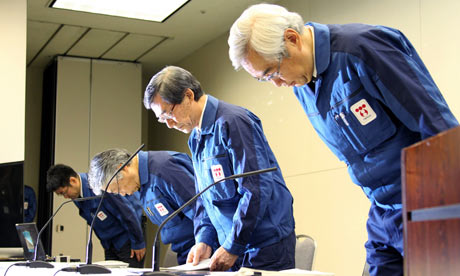Fukushima evacuees demand compensation
Residents and business owners forced to leave areas near the Fukushima Daiichi plant protest outside Tepco headquarters

Fukushima nuclear plant bosses, including Tepco president Masataka Shimizu (second right), have apologised for the disaster. Photograph: Asahi Shimbun via Getty
Residents and business owners in Japan who have been forced to leave their homes amid radiation fears on Wednesday demanded immediate damages from the company at the centre of the nuclear crisis.
About 20 people who have been evacuated from areas near the Fukushima Daiichi plant protested outside the Tokyo Electric Power Company (Tepco) headquarters, calling for a quick decision on possible compensation.
The company's president, Masataka Shimizu, apologised during a rare public appearance and said he would compensate the tens of thousands of people whose lives have been disrupted by the nuclear emergency.
Japanese media suggests other domestic utilities could be asked to help pay damages, an approach adopted in the aftermath of the Three Mile Island disaster in the US in 1979.
Shimizu and other Tepco executives bowed in apology and promised that cash payments were being prepared. Shimizu, whose handling of the world's worst nuclear accident since Chernobyl has been widely criticised, said the firm would do its utmost to stabilise the stricken reactors and enable evacuees to rebuild their businesses.
Safety officials have raised the severity level of the crisis to a maximum seven – the same as Chernobyl – although the quantities of radiation at Fukushima are one-tenth of those released by the Soviet plant. Government officials have conceded it could take months to bring the reactors under control.
Fears of contamination have devastated farming and fishing communities in the area. Tepco, however, was unable to say when compensation would be paid, or how much.
The promise of cash was not enough for one protester outside the firm's headquarters in the capital. "I can't work and that means I have no money," Shigeaki Konno, a car mechanic who lived seven miles from the Fukushima plant before he was forced to leave, told Reuters. "The talk about compensation is not concrete. We need it quickly."
Kensuke Takeuchi, a manager at Tepco, said the firm was not yet in a position to compensate residents, adding that he would pass on the protesters' demands to executives.
Despite the magnitude of the accident, and errors in Tepco's initial handling of the crisis, the government appears determined to ensure the firm's survival. Yomiuri Shimbun newspaper reported that Tepco and the government were considering placing a £15bn to £28bn cap on the company's liabilities to avoid financial ruin in the face of compensation claims that could reach £80bn.
The nuclear power company, which has lost three-quarters of its market value since the tsunami on 11 March, is Japan's largest issuer of corporate bonds and its shares are widely held by financial institutions.
The government's chief spokesman, Yukio Edano, said he was not aware of the payout plan. "I have not been notified beyond what has been reported in the media," he said.
On Tuesday the prime minister, Naoto Kan, said Tepco would be responsible for compensating victims but it was the government's job to ensure the payments were made.
Shimizu said he was not aware of the scheme, and refused to discuss calls for his resignation. "My biggest responsibility is to resolve the situation at the Fukushima Daiichi plant, support people who have been evacuated and make sure we provide electricity by overcoming the supply shortage as soon as possible," he said. "I am not in a position to comment on whether or not I will resign."
Under the proposals Tepco would be required to pay 100bn to 200bn yen a year for 15 years. Other utilities would contribute to a 2.7tn yen fund, with the remainder of the compensation coming from the state.
The agony for communities near the plant shows no signs of ending, despite assurances from Kan that the operation to reduce radiation leaks was making progress. Sixteen towns and facilities have been ordered to stop shipping produce, while tsunami damage has destroyed fishing and farming businesses across Japan's north-east coast.
No comments:
Post a Comment